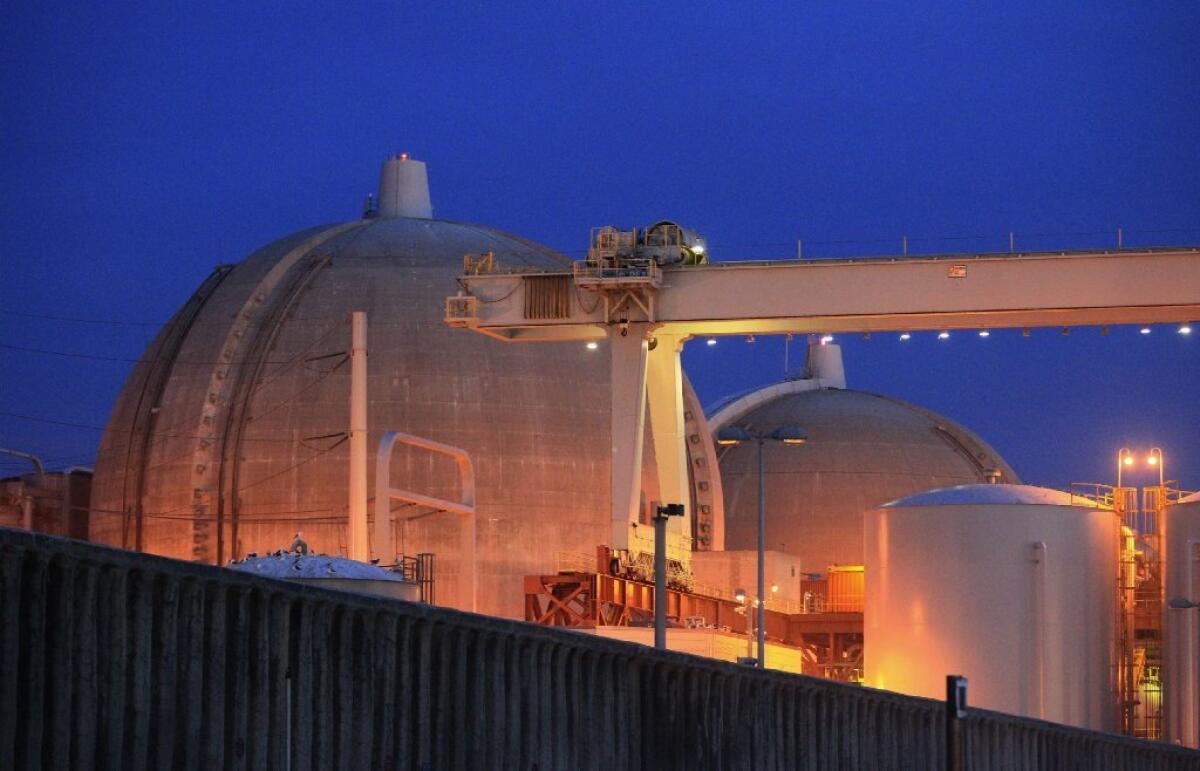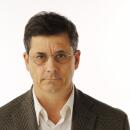Activists push for relocation of San Onofre nuclear waste

- Share via
Environmental activists who settled a lawsuit against the California Coastal Commission and Southern California Edison after the utility agreed to make “commercially reasonable” efforts to relocate millions of pounds of nuclear waste are now asking a judge to enforce the deal.
The Citizens Oversight community group and activist Patricia Borchmann filed a motion in San Diego Superior Court this week asking Judge Timothy B. Taylor to order Edison to halt the transfer of spent fuel from wet to dry storage at the site of the failed San Onofre nuclear plant north of Oceanside.
They also want the judge to allow them access to at least some of Edison’s internal records.
“Since entering into the settlement agreement, it has been revealed SCE has engaged in a pattern of dangerous practices that will likely compromise, if not make it impossible, to transfer the spent nuclear fuel to an off-site storage facility as required by the settlement agreement,” the motion states.
The Coastal Commission did not respond to questions about the motion.
Edison said it has consistently complied with the agreement and is making the progress required under the settlement terms.
“Southern California Edison continues to implement its obligations under the settlement agreement in good faith and provides periodic reports on its progress,” the company statement said. “These reports are published on the San Onofre Nuclear Generating Station website.”
The company announced in June that it had hired a team of experts to begin outlining steps to move the waste from San Onofre.
“Getting SONGS spent nuclear fuel off site is a top priority for SCE, as is safely managing the fuel while it is on site,” Edison said.
A hearing in San Diego Superior Court has been scheduled for Nov. 1.
The plant closed in 2012 amid a radiation leak caused by a faulty replacement generator.
The plaintiffs sued the Coastal Commission and Edison in 2015, weeks after regulators approved the utility’s application to develop an interim dry storage facility for spent fuel at San Onofre.
The lawsuit claimed the storage plan was susceptible to rising seawater and earthquakes and said it was dangerous to millions of people who live nearby.
After a judge declined to dismiss the suit, lawyers on both sides reached a deal in 2017 calling for Edison to make “commercially reasonable” efforts to relocate the waste and to hire a panel of independent experts to study how and where it could be moved.
The 17-page motion filed Monday accused Edison of withholding information from the public about an August 2018 mishap, when a 50-ton canister filled with nuclear waste was wedged 18 feet above the ground for nearly an hour.
The plaintiffs also complained that the company committed multiple violations of U.S. Nuclear Regulatory Commission rules related to the fuel transfer program.
“During a ‘community engagement meeting’ on 9 August 2018, SCE representative Tom Palmisano falsely stated SCE paused operations at San Onofre for ‘crew rest’,” the motion states. “During this meeting, SCE failed (to) reveal an incident where a canister was left unsupported and could have fallen 18 feet.”
Federal regulators later fined Edison $116,000 and chided Edison for not reporting the event properly.
According to the court filing, Edison also committed a series of earlier violations that could have undermined the integrity of the canisters. If the 75 or so storage casks are not secure, they may not be able to be safely moved to a permanent location, the plaintiffs alleged.
“SCE’s frequent safety violations in storing the spent fuel, if not corrected or stopped, will negatively affect SCE’s ability to use commercially reasonable efforts to move the spent nuclear fuel to a safer location because the integrity of the canisters has been compromised,” it states.
The utility said the canisters have been inspected and approved by the NRC.
“The dry spent fuel storage systems in use at SONGS continue to meet all regulatory and safety requirements,” the Edison statement said.
The filing also claims that the plaintiffs tried to resolve their differences with the utility through mediation but failed. At one point, plaintiffs requested that Edison appoint a receiver to oversee the fuel transfer and relocation plan, but that idea went nowhere, the motion added.
“Because ongoing mediation communications and attempts to resolve conflicts stemming from SCE’s downloading errors have proven futile, petitioners now present the instant motion to enforce the settlement agreement,” it states.
Edison consultant Gary Lanthrum said that scrapes and scratches on the storage canisters could be a problem, because sharp edges can create corrosion.
“It’s a legitimate concern, but it’s a concern that can be answered,” he said in a telephone interview Wednesday. “Even though there were some scratches, there’s more than enough metal to accommodate structural requirements for long-term storage.”
The issue of storing nuclear waste has vexed utility companies and federal regulators for decades.
Under existing law, the U.S. government is required to create a permanent repository for the material, which remains dangerous to humans for thousands of years. But Congress and the White House have been unable to agree on a site location.
In the meantime, utilities generally store spent fuel on site, usually in cooling pools and in canisters like those employed at San Onofre that could eventually be moved.
Edison wants to finish transferring the waste from wet to dry storage so it can move forward with decommissioning the rest of the plant and return the property to the U.S. Navy, as called for under its original lease.
Citizens Oversight and Borchmann are not the only activists suing Edison over its handling of the San Onofre nuclear waste.
In August, the San Diego nonprofit group Public Watchdogs filed a federal lawsuit against Edison and the NRC accusing the company and regulators of shirking their responsibility to protect the 8 million-plus residents who live within 50 miles of the shuttered power plant.
Edison spokesman John Dobken has told the Union-Tribune, “With the nuclear reactors at San Onofre permanently defueled and SONGS used fuel having decayed for seven years, there are no credible accident scenarios that would produce an offsite radiological release.”
The U.S. District Court claim also is asking a judge to order Edison to stop the fuel transfer program. To date, no such order has been issued.
MacDonald writes for the San Diego Union-Tribune.
More to Read
Sign up for Essential California
The most important California stories and recommendations in your inbox every morning.
You may occasionally receive promotional content from the Los Angeles Times.














